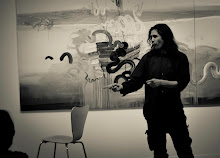With my philosopher's head on, the really interesting part of performance is to explore the gamut of emotions (well really 'Affects', if I am being technical) that underpin, overarch or perhaps infuse thought in general and certain thinkers in particular.
And yet that statement gets it wrong (slightly). We are all so used to the emotion/thought dichtomy, that we tend to assume that the emotions are either explaining thought or else clouding it (and so somehow ought to be absent). This Dichotomy would have us believe that either emotions help us therefore 'know the thinker' and 'explain his thought', or else have no place in any rational thought - and if this was the case then performance philosophy would, I think, be as pointless as it was impossible.
Luckily (for me) the real relationship between emotion and thought is so much richer than this, and performance offers an opportunity to explore this richness. In making this argument I understand myself to be drawing on Deleuze (but also Foucault) who argue that great thinkers are great stylists. More than that, they are writers and explorers of the human soul for their method involves catching up their affects in their thought - sometimes using them as topics, at others dismissing them (and so arguing openly against them or pitching them against logic), while at other times riding them like a breaking wave. A work such as Wollstonecraft's 'The Vindication of the Rights of Women' or Spinoza's 'Ethics' is therefore a witch ride like nothing else in literature, for one never really knows where the affects which it conjures up or shares, and the argument of the book is taking one. That is, to read such works is to be taken on an emotional journey, where one is infused with feelings, but those feelings are then the topic of discussion, and reforged in the light of the very fiery words that inspired them.
Or to put it slightly differently, a truly great philsopher is one that reaches into our mind, and makes it jangle, but then from the discord of rational thought and feeling, plays some kind of new tune, a new melody, in our minds: This tune is like no other for its effect is that in singing it, our natures themselves become re-thinkable. It is this facet of reaching out, and allowing a chink of thought, that makes both philosophy and performance great. It is why then they can be so easily combined. - That is, it is why philosophy makes great drama.
But more than that, it is this emotional lexicon that makes performing thought easy and fun: It you get the thinker right, then the argument and the actions follow. When people ask then, as they do, 'how do you remember all that', I always feel like saying, for me it is like simply remembering who one is: For the philosopher I perform (and their arguments) are stalwarts in my mind (and in a sense, as they are part of the tradition of thought that gave us so many of the ideas we all live by, of all our minds). All I do is find then the affects that infuse those individuals, and the thoughts, and their arguments follow.
It is therefore this idea of combining passion with argument (a method which she pioneered), that 'makes' my recent performance of Mary Wollenscraft. I had not had much time to work on the exact words, but I got the affects right, and everything else followed when I was in front of the audience, and the fiery power of the Vindication coursed though me: Next time I perform this piece (and there will be a next time), it will be more polished - but I hope I will keep that level of emotional intensity....


No comments:
Post a Comment